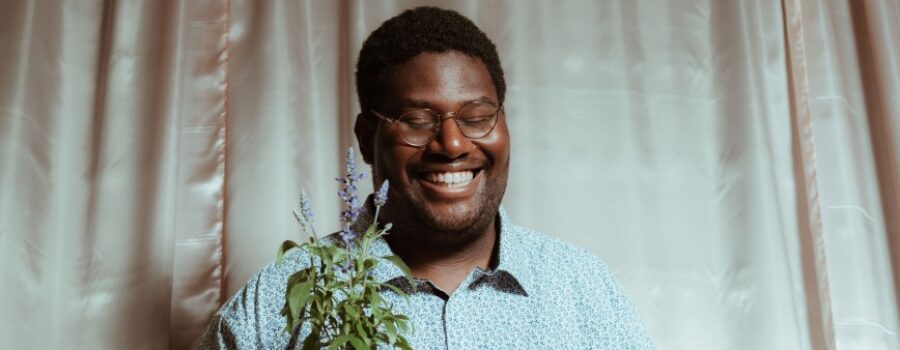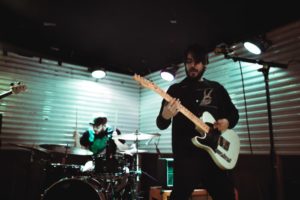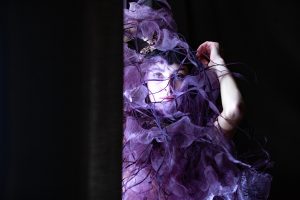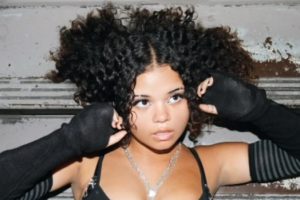Photo Credit: Kristina Pedersen
Last week Cedric Noel dropped ‘Hang Time,’ and it’s an album that people like myself are going to wrap themselves in as the foundation for the songs that make it up are based around self-identity. After hearing just a piece of Cedric’s story, I could not wait to ask a million and one questions. However, not wanting to take too much of his time, I asked only a handful in this back and forth exchange that covers everything from fitting in to the new album, and everything in between.
Kendra: Reading your story, there is so much I can relate to, and I know all too well the feeling of being “not Black enough.” For me, it came pretty early when I noticed the only other Black girls in school had these lavish tales of getting their hair done, and they told me I didn’t need to do that. When did you first start to feel different?
Cedric Noel: I always have to a certain extent. I was born in Niger and adopted by a Mozambican/Belgian mother and a Canadian father. My sister is adopted too and was born in Vietnam. We lived in a lot of different countries when I was growing up. So that doesn’t exactly set you up to feel like you’re “in” with most folks around you.
So with that in mind, I always felt on the outside looking in. That was especially true in terms of my black identity because my life experience didn’t adhere much to the stereotypical black African, European, or North American experience. That experience probably led me to form a personality somewhat outside of those cultural lines? Once I hit my twenties though I started to see that as a positive and ten years later I only feel more comfortable with my black identity.
Kendra: For those wondering why I’d start with that question – it’s because self-identity is the foundation for your November 2021 release, ‘Hang Time.’ You’d been working on this one for a few years now, right? Were there any songs or ideas that you just couldn’t flesh out for this album that we may hear down the road?
Cedric Noel: I don’t necessarily think so. I think I had around 20-23 songs I wrote for this project that I liked. There are a few more songs that I recorded in the same sessions for Hang Time that I had to cut for time and a few songs I fully wrote but didn’t decide to record. But I do feel like I got out most of what I wanted. I had a couple of attempts writing about identity, so there are full albums of half-finished songs and ideas that I didn’t think were very good. But if you’re asking whether I had a hard time emotionally or musically to get other songs out, I don’t think so. I feel lucky that I was able to find the right songs for this project. That being said I’m sure I’ll write about self-identity in the future as I continue to figure myself out like most folks.
Kendra: Over the years I’ve gotten to write a bit about self-identity and it always feels like a little weight has been lifted off my back when I get to air some of my thoughts and experiences. You got to explore this over a baker’s dozen’s worth of songs. Was this the most therapeutic writing you’ve done to date?
Cedric Noel: I very much empathize with this feeling. I think at the time of writing that album, yes it definitely had been. A lot of those emotions had been there for a long time and I’d never decided to consciously address them in music before. I’ve written and released a couple of albums since finishing Hang Time (nothing, forever everything, and Patterning) and have written for a few more moving forward so I’ve had some intense therapeutic moments writing for those as well. It all feels good though, I feel really fortunate to have music and improvisation as an avenue for emotional release.
Kendra: I dove into the pop-punk/emo scene during college out in LA and back in the day you could always sort of count the number of Black people in the room, and rarely were they ever on stage. You found yourself in the indie scene up in Ottawa. Did your feelings about fitting in vary from when you were merely a fan in the crowd to when you were being an artist on stage?
Cedric Noel: I’m not sure, that’s definitely an interesting question. I spent about a year in Ottawa and had friends in the music scene for sure but I don’t think I could consider myself in it really. I think as a performer I’m pushing myself to include more people in whatever scene I’m a part of. To make them feel welcome, safe, included, or wanted. That’s one of my top priorities. Music scenes can feel very intimidating as a music enthusiast or as a performer so breaking down those false barriers feels necessary. I think I’ve mostly understood myself as a performer/artist. It was for only a small amount of time that I wasn’t a performer when I entered the music scene in Fredericton, New Brunswick. I remember going to my first shows and having a want to play as well. So I feel like my perspective has mostly been on the artist and music supporter side rather than only in the audience.
Kendra: You said you wrote this record primarily for your teenage self. What do you think 15-year-old Cedric would say after listening?
Cedric Noel: I think he would be impressed! Ha. At that point I was just getting into writing little songs here and there and very nervously performing at the school talent shows so I’d like to think he’d be proud? I’d also hope he’d see this album as proof that his identity was valid even at the time. I hope that if a young black kid gets to hear this record, they can feel seen through the music. If that happened just even once it would be amazing, truly.
Kendra: You also noted that you hope “this album can contribute to the reimagination of what is understood as ‘black music’ and help remove the boundaries that term currently encompasses.” With that, do you think we’re heading towards a day where music is colorless? I mean, we’ve kinda done away with genre in many ways…but could racial divisions be next?
Cedric Noel: Yeah! I mean music already is and pretty much has always been that. As humans, we’ve set some pretty silly and ridiculous rules when it comes to music genres and race/culture. If we truly look at the history of western music as it is today, so much of that comes from African-American and African roots. So not only do blues, jazz, hip-hop, pop have black roots but also indie-rock and so many kinds of experimental music that are understood as “white genres.” I feel so inspired by the black and POC music creators doing away with those borders and reclaiming them. It’s about time.
Kendra: With a new album out in November, what else can people be on the lookout for as we wrap up this year and move on to the next?
Cedric Noel: A few things I think. 🙂 I’ll be playing a couple of shows with label-mates No Joy in Canada and I’ll have an album release show in Montreal as well. I’m planning to do a good amount of touring in the next year with my own project and with friends’ projects as well. And I’m working on new music of my own and hopefully some collaborations as well. I’ve played a few shows of late in Montreal and it has me excited at the prospect of sharing music and space with folks I don’t know moving forward. Hopefully, I’ll be able to do that.






